|
|
|
Sort Order |
|
|
|
Items / Page
|
|
|
|
|
|
|
| Srl | Item |
| 1 |
ID:
190052
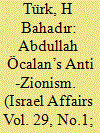

|
|
|
|
|
| Summary/Abstract |
Anti-Zionism has been a salient component of rightwing and leftwing movements in Turkey. The Kurdistan Workers’ Party (Partiya Karkerên Kurdistan, PKK) that took its cue from the Turkish Left has become a topic of discussion since its founding in 1978. Yet little effort has been devoted to analysing the political thought of the PKK’s leader, Abdullah Öcalan. Using an interpretative-textual method, this article seeks to fill this lacuna by discussing the role of anti-Zionism in Öcalan’s thought.
|
|
|
|
|
|
|
|
|
|
|
|
|
|
|
|
| 2 |
ID:
072554
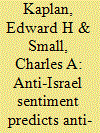

|
|
|
|
|
| Publication |
2006.
|
| Summary/Abstract |
In the discourse surrounding the Israeli-Palestinian conflict, extreme criticisms of Israel (e.g., Israel is an apartheidstate,theIsraelDefenseForcesdeliberatelytargetPalestiniancivilians),coupled with extreme policy proposals (e.g., boycott of Israeli academics and institutions, divest from companies doing business with Israel), have sparked counterclaims that such criticisms are anti-Semitic (for only Israel is singled out). The research in this article shines a different, statistical light on this question: based on a survey of 500 citizens in each of 10 European countries, the authors ask whether those individuals with extreme anti-Israel views are more likely to be anti-Semitic. Even after controlling for numerous potentially confounding factors, they find that anti-Israel sentiment consistently predicts the probability that an individual is anti-Semitic, with the likelihood of measured anti-Semitism increasing with the extent of anti-Israel sentiment observed.
|
|
|
|
|
|
|
|
|
|
|
|
|
|
|
|
| 3 |
ID:
127334
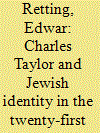

|
|
|
|
|
| Publication |
2013.
|
| Summary/Abstract |
The Jewish world is losing its ability to discuss its cultural differences. Our intra-Jewish dialogue is becoming less coherent. Indeed, the very ideas underlying our Jewish identities, ideas shaped by our language of values, are diverging. The language we use to describe our values is becoming more specific to the respective Jewish communities to which we belong, in Israel and in the Diaspora. We could be heading for a crisis.
|
|
|
|
|
|
|
|
|
|
|
|
|
|
|
|
| 4 |
ID:
127336
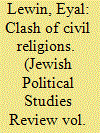

|
|
|
|
|
| Publication |
2013.
|
| Summary/Abstract |
Almost thirty-five years after Camp David and twenty years after the Oslo Accord, a fundamental question remains unanswered: does the majority of the Israeli public support a left-wing or right-wing ideology? The answer, in a democratic system, should be obvious, since elections are supposed to give a clear picture of the political preferences of the voting public. However, Israeli polls are misleading. After the Yom Kippur disaster in 1977, Menachem Begin won his premiership running as the hawkish leader who never would surrender even one grain of sand from the Land of Israel. Yet after he personally gave up the entire Sinai Peninsula his party won an even greater majority in 1981.1 Yitzhak Rabin won his premiership in 1992 representing the hawkish section of the Labor party with declarations that he would never negotiate with the PLO;2 yet it seems that signing the Oslo Accords led him, rather, to the peak of his popularit.
|
|
|
|
|
|
|
|
|
|
|
|
|
|
|
|
| 5 |
ID:
172908
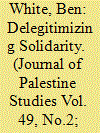

|
|
|
|
|
| Summary/Abstract |
In response to growing Palestine solidarity activism globally—and particularly in countries that have been traditional allies of Israel—the Israeli government has launched a well-resourced campaign to undermine such efforts. A key element of this campaign consists in equating Palestine advocacy; the Boycott, Divestment, Sanctions (BDS) movement; and anti-Zionism with anti-Semitism. The concerted effort to delegitimize solidarity with the Palestinians is taking place even as genuine anti-Semitism is on the rise, thanks to the resurgent white nationalism of the Far Right in Europe and North America—political forces that Israel is harnessing to help shield from scrutiny and accountability its apartheid policies toward Palestinians, both citizens of the state as well as those under military rule. In its efforts to conflate anti-Zionism with anti-Semitism, the Israeli government is assisted by non-state organizations that nonetheless enjoy close ties with the state and its agencies.
|
|
|
|
|
|
|
|
|
|
|
|
|
|
|
|
| 6 |
ID:
127333
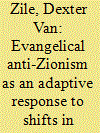

|
|
|
|
|
| Publication |
2013.
|
| Summary/Abstract |
Since the founding of the Jewish state in 1948, Evangelical Protestants in the United States have been regarded-with good reason-as Israel's most reliable supporters. In 2008, Jody C. Baumgartner and a number of other researchers reported that Evangelicals are "more likely than other Americans to have sympathy for Israel in its dispute with the Palestinians and to agree that the United States should take Israel's side more often in the Middle East."1 More recently, a poll conducted by the Pew Charitable Trust indicated that Evangelicals are more likely than other American Jews to believe that God gave the land to the Jewish people.2 In addition to the belief that God's promises endure forever, much Evangelical support for Israel is motivated by an understanding of the religious component of Arab hostility toward Israel. Evangelicals, Baumgartner and her colleagues reported, are "significantly more likely than other Americans to agree that Islam is a more violent religion than Christianity, Judaism, or Hinduism."3 Other factors related to Evangelical support for Israel include an adherence to premillenial dispensationalism (an eschatology that posits that the return of the Jews to their homeland is a precursor to the return of Jesus Christ),4 gratitude to the Jewish people for their scriptures, and remorse over the Holocaust.5
|
|
|
|
|
|
|
|
|
|
|
|
|
|
|
|
| 7 |
ID:
192292
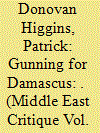

|
|
|
|
|
| Summary/Abstract |
Commentators across Anglophone media and academic institutions frequently have minimized the role of US-led imperialism in Syria. This trivialization has been made possible by the covert nature of the war’s initial phases. Therefore, this article aims to piece together some of the most conspicuous aspects of the empirical record of the war. It begins with a historical overview of major US attacks against Syria, as well as prevailing attitudes about Syria within the US National Security Establishment (NSE), between the end of the WWII and 2011. The second part aggregates and reviews the existing empirical record on the current war, beginning with the Bush Administration’s preparations for operations subsequently launched under the Obama Administration in 2011, then continuing to be waged under the following administrations. The conclusion offers some theoretical remarks on the wider regional context of the US’s aims in Syria, highlighting their connections to various developments elsewhere in the region, ranging from similar wars nearby, to recent political losses suffered by the Palestinian national movement.
|
|
|
|
|
|
|
|
|
|
|
|
|
|
|
|
| 8 |
ID:
151822
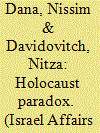

|
|
|
|
|
| Summary/Abstract |
While Holocaust denial existed even during the Holocaust itself, this phenomenon has substantially expanded and diversified over the past decades. This ranged from the advent of technologies that shifted the debate to new platforms and forums, to Israel’s comparison to Nazi Germany, to Islamist-driven Holocaust denial and anti-Semitism on European streets. Paradoxically, concurrently with the intensification of Holocaust denial by Arabs and Muslims, they have made massive use of Holocaust symbols, language, and discourse in their national struggle. This article presents this paradox ‒ Arab Holocaust denial and Holocaust memory manipulation ‒ in an attempt to identify ways and means to address this phenomenon against the backdrop of the Arab‒Israeli conflict.
|
|
|
|
|
|
|
|
|
|
|
|
|
|
|
|
| 9 |
ID:
190051
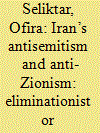

|
|
|
|
|
| Summary/Abstract |
The discussion of Iran’s antisemitism and anti-Zionism has been separated from the debate on the Islamist regime’s nuclear project. A synthesis of the issues is needed given that both are the core of the regime’s foreign policy. Some observers consider the regime’s antisemitism and anti-Zionism – promising Israel’s destruction – to be eliminationist. Most others, however, argue that the rhetoric is performative, designed to bolster the Shiite theocracy in a predominantly Sunni region. While the debate cannot be settled, it is well known that nuclear warfare does not allow for a margin of error in predictions. Should the advocates of performative anti-Zionism be wrong, millions of Jews and others would die.
|
|
|
|
|
|
|
|
|
|
|
|
|
|
|
|
| 10 |
ID:
190049
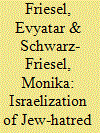

|
|
|
|
|
| Summary/Abstract |
A new wave of antisemitism has lately emerged, mostly directed against the Jewish state of Israel. It justifies itself with a new formulation that obfuscates Jew-hatred and its main bearers are Western left-oriented academics. A worrying fact is the large number of Jewish intellectuals, among them Israelis, who support such positions. This reflects the deepening ideological differences in present-day Jewry with regard to the Jewish state and its characteristics, an issue that is insufficiently addressed.
|
|
|
|
|
|
|
|
|
|
|
|
|
|
|
|
| 11 |
ID:
190045
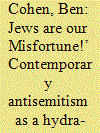

|
|
|
|
|
| Summary/Abstract |
Antisemitism has once again proven itself to be an international phenomenon, crossing borders and cultures with ease and adept at finding major issues in the public square, such as the COVID-19 pandemic, upon which to hang its claims. This article argues that antisemitism currently takes four major forms: Anti-Zionist antisemitism, which targets the State of Israel as a Jewish collectivity; Neo-Traditionalism, which revives pre-modern anti-Judaic notions in contemporary guise; Holocaust relativisation, which involves instrumentalizing and distorting the nature of the Holocaust without denying it outright; and anti-Judaism, which manifests in efforts to ban circumcision, kosher slaughter and other core Jewish rituals. The article concludes by examining whether the International Holocaust Remembrance Alliance (IHRA) Working Definition of Antisemitism is an adequate tool for engaging with a growing problem, suggesting ways in which the definition might be amended to make it more effective.
|
|
|
|
|
|
|
|
|
|
|
|
|
|
|
|
| 12 |
ID:
190048
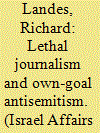

|
|
|
|
|
| Summary/Abstract |
This article examines the close relationship between the consistent practice of lethal journalism (in this case reporting Palestinian war propaganda as news) among Western journalists, and the sudden appearance of the ‘new antisemitism’ at the turn of the last millennium. It looks closely at two cases – the al-Durah ‘murder’ (September 2000) and the Jenin ‘massacre’ (April 2002), and the manner in which this allegedly professional journalism opened the door to a host of postmodern antisemitic themes, from Holocaust inversion to progressive supersessionist projections, and the manner in which Jihadists bent on destroying the West have used through this unacknowledged hostility to Jews – it’s merely criticism of Israel – as the West’s soft underbelly.
|
|
|
|
|
|
|
|
|
|
|
|
|
|
|
|
| 13 |
ID:
124367
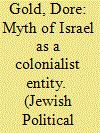

|
|
|
|
|
| Publication |
2011.
|
| Summary/Abstract |
While modern Israel was born in the aftermath of the British Mandate for Palestine, which called for a Jewish national home, its roots preceded the arrival of the British to the Middle East. In that sense Britain was not Israel's mother-country, like France was for Algeria. Indeed, the Jews were already reestablishing their presence independently in their land well before the British and French dismantled the Ottoman Empire. As time went on, it became clear that the British Empire was not the handmaiden of Israel's re-birth, but rather its main obstacle. The accusation that Israel has colonialist roots because of its connection to the British Mandate is ironic, since most of the Arab states owe their origins to the entry and domination of the European powers.
|
|
|
|
|
|
|
|
|
|
|
|
|
|
|
|
| 14 |
ID:
154495
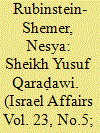

|
|
|
|
|
| Summary/Abstract |
This article discusses Sheikh Yusuf al-Qaraḍawi’s approach toward Judaism, Zionism and the State of Israel. Using Irwin Cotler’s nine-point definition of anti-Semitism, it will endeavour to position Qaraḍawi’s on an anti-Semitism-anti-Zionism scale.
|
|
|
|
|
|
|
|
|
|
|
|
|
|
|
|
| 15 |
ID:
164819
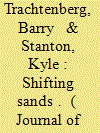

|
|
|
|
|
| Summary/Abstract |
The current willingness of major American Jewish organizations and leaders to dismiss the threat from white supremacists in the name of supporting Israel represents a new stage in the shifting relationship of U.S. Jews toward Zionism. In the first stage, during the late nineteenth and early twentieth centuries, the majority of U.S. Jews did not take to Zionism, as its goals seemed antithetical to their aspirations to join mainstream American society. In a second stage, attitudes toward Zionism grew more positive as conditions for European Jews worsened, and Jewish settlement in Palestine grew substantially. Following Israeli statehood in 1948, U.S. Jews began gradually to support Israel. Jewish groups and leaders increasingly characterized criticism of Zionism as inherently anti-Semitic and attacked Israel's critics. In a third and most recent stage, many major Jewish organizations and leaders have subordinated the traditional U.S. Jewish interest in combatting white supremacy and bigotry when it comes into conflict with support for Israel and Zionism.
|
|
|
|
|
|
|
|
|
|
|
|
|
|
|
|
| 16 |
ID:
190046
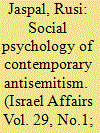

|
|
|
|
|
| Summary/Abstract |
This article focuses upon the social psychological aspects of antisemitism. Empirical research into three forms of antisemitism is reviewed through the lens of social psychological theories of social representation, intergroup relations and identity processes. Across research, perceived threat from Jews and Israel is a recurrent theme. The proposed integrative model suggests that negative social representations of Jews and Israel that accentuate intergroup threat can in turn have implications for identity processes at an individual level, mainly by curtailing feels of self-esteem, self-efficacy, continuity and distinctiveness. Identity threat can lead the individual to react defensively by engaging in antisemitism.
|
|
|
|
|
|
|
|
|
|
|
|
|
|
|
|
| 17 |
ID:
127332
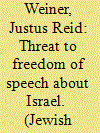

|
|
|
|
|
| Publication |
2013.
|
| Summary/Abstract |
On February 8, 2010, Michael Oren, Israel's ambassador to the United States, began speaking to a packed hall at UC Urvine. Moments into his remarks, Oren was loudly interrupted by a group of students that spent the remainder of his talk hurling crude and unsubstantiated accusations at him. The disrupters delayed Oren's speech by nearly an hour, significantly foreshortened his remarks, and almost prevented the audience from hearing him at all. Faculty pleas for restraint were ignored. Both the university and the state of California responded vigorously. University administrators suspended individual student disrupters and the organization to which they belonged while the local District Attorney charged, and successfully convicted, the hecklers for interfering with a public meeting. Both the activists' behavior and the response of the authorities have drawn severe criticism from observers, and all sides present themselves as the genuine defenders of free speech and First Amendment principles. - See more at: http://jcpa.org/article/the-threat-to-freedom-of-speech-about-israel/#sthash.MHHuCtpj.dpuf
|
|
|
|
|
|
|
|
|
|
|
|
|
|
|
|
| 18 |
ID:
190991
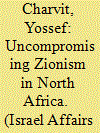

|
|
|
|
|
| Summary/Abstract |
In July 1950, Moroccan Rabbi Yahya Ben Harosh wrote a letter to his students chastising those exposed to ultraOrthodox anti-Zionist influences for disparaging and denigrating Zionist leaders and the founders of the State of Israel. This article discusses the historical background to the letter, including the ideological foundation of the rabbi’s vigorous protest: from his position regarding the messianic concept to the religious affirmation of Zionism as a national-liberation movement. As such, Ben Harosh’s stimulating letter is not an isolated episode but a reflection of the longstanding religious and ideological antecedents of Zionism, dating back to the 16th century, which contained the main elements of the would-be Zionist endeavour. So much so that it is arguable that the 16th century set in motion a fundamental process worthy of being the departure point of Zionist historiography.
|
|
|
|
|
|
|
|
|
|
|
|
|
|
|
|
|
|
|
|
|